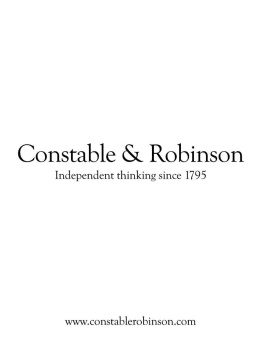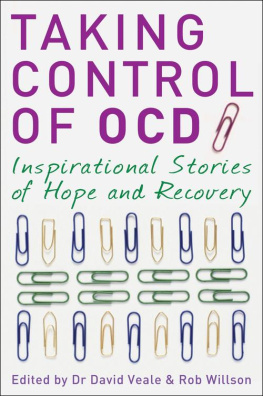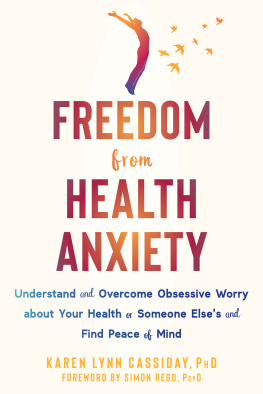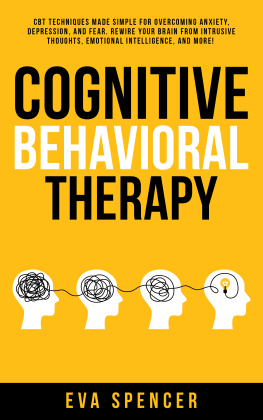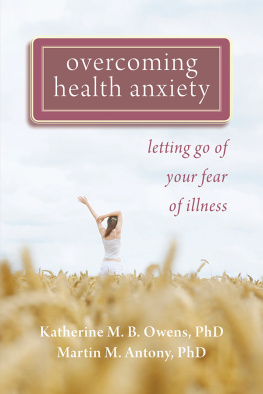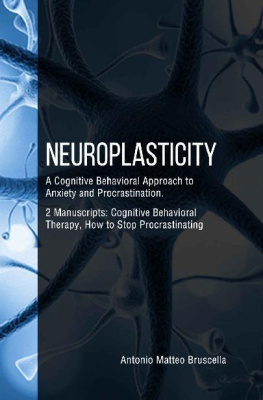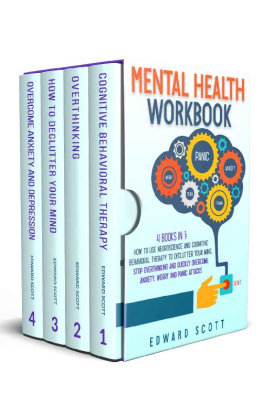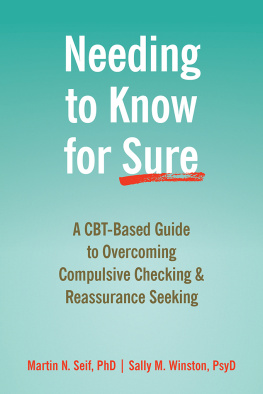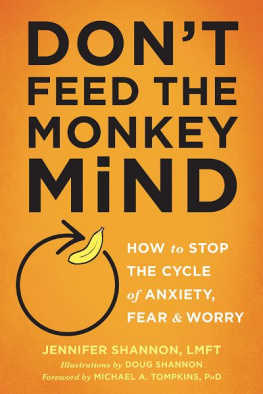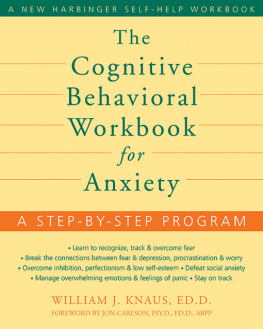Rob Willson is a cognitive behavior therapist in private practice. He is a tutor at Goldsmiths College, University of London, and studying for a PhD at the Institute of Psychiatry, Kings College London. He holds an Honours degree in Psychology, an MSc in Rational Emotive Behavior Therapy, and a Postgraduate Diploma in Social and Behavioral Health Studies. He has been involved in treating individuals with health anxiety for the past thirteen years. David Veale and Rob Willson are authors of Overcoming Obsessive Compulsive Disorder , Overcoming Body Image Problems (including Body Dysmorphic Disorder) and Manage Your Mood , also published by Constable & Robinson, and Rob is author of Cognitive Behavioural Therapy for Dummies published by Wiley.
Dr David Veale is a consultant psychiatrist in cognitive behavior therapy at the South London and Maudsley Trust and the Priory Hospital North London. He is an Honorary Senior Lecturer at the Institute of Psychiatry, Kings College, London. He is an accredited cognitive behavior therapist and was President of the British Association of Behavioural and Cognitive Psychotherapies from 2006 to 2008. He sat on the National Institute for Health and Clinical Excellence (NICE) working group that provided guidelines for treating obsessive compulsive disorder (OCD) and body dysmorphic disorder (BDD) in the UK. He has about seventy publications to his name, and his own website, www.veale.co.uk.
The aim of the Overcoming series is to enable people with a range of common problems and disorders to take control of their own recovery program. Each title, with its specially tailored program, is devised by a practising clinician using the latest techniques of cognitive behavioral therapy techniques which have been shown to be highly effective in helping people overcome their problems by changing the way they think about themselves and their difficulties. The series was initiated in 1993 by Peter Cooper, Professor of Psychology at Reading University in the UK whose book on overcoming bulimia nervosa and binge-eating continues to help many people in the UK, the USA, Australasia and Europe.
Titles in the series include:
OVERCOMING ANGER AND IRRITABILITY
OVERCOMING ANOREXIA NERVOSA
OVERCOMING ANXIETY
OVERCOMING BODY IMAGE PROBLEMS
OVERCOMING BULIMIA NERVOSA AND BINGE-EATING
OVERCOMING CHILDHOOD TRAUMA
OVERCOMING CHRONIC FATIGUE
OVERCOMING CHRONIC PAIN
OVERCOMING COMPULSIVE GAMBLING
OVERCOMING DEPERSONALIZATION AND FEELINGS OF UNREALITY
OVERCOMING DEPRESSION
OVERCOMING GRIEF
OVERCOMING HEALTH ANXIETY
OVERCOMING INSOMNIA AND SLEEP PROBLEMS
OVERCOMING LOW SELF-ESTEEM
OVERCOMING MOOD SWINGS
OVERCOMING OBSESSIVE COMPULSIVE DISORDER
OVERCOMING PANIC
OVERCOMING PARANOID AND SUSPICIOUS THOUGHTS
OVERCOMING RELATIONSHIP PROBLEMS
OVERCOMING SEXUAL PROBLEMS
OVERCOMING SOCIAL ANXIETY AND SHYNESS
OVERCOMING STRESS
OVERCOMING TRAUMATIC STRESS
OVERCOMING WEIGHT PROBLEMS
OVERCOMING WORRY
OVERCOMING YOUR CHILDS FEARS AND WORRIES
OVERCOMING YOUR CHILDS SHYNESS AND SOCIAL ANXIETY
OVERCOMING YOUR SMOKING HABIT
All titles in the series are available by mail order.
Please see the order form at the back of this book.
www.overcoming.co.uk
OVERCOMING HEALTH ANXIETY
A self-help guide using Cognitive Behavioral Techniques
ROB WILLSON AND DAVID VEALE
ROBINSON
London
Constable & Robinson Ltd
3 The Lanchesters
162 Fulham Palace Road
London W6 9ER
www.constablerobinson.com
First published in the UK by Robinson,
an imprint of Constable & Robinson Ltd, 2009
Copyright Rob Willson and David Veale, 2009
The rights of Rob Willson and David Veale to be identified as the authors of this work has been asserted by them in accordance with the Copyright, Designs and Patents Act, 1988.
All rights reserved. This book is sold subject to the condition that it shall not, by way of trade or otherwise, be lent, re-sold, hired out or otherwise circulated in any form of binding or cover other than that in which it is published and without a similar condition including this condition being imposed on the subsequent purchaser.
A copy of the British Library Cataloguing in
Publication Data is available from the British Library.
Important Note
This book is not intended as a substitute for medical advice or treatment. Any person with a condition requiring medical attention should consult a qualified medical practitioner or suitable therapist.
ISBN 978-1-84529-824-1
Printed and bound in the EU
1 3 5 7 9 10 8 6 4 2
Table of contents
Acknowledgements
We would like to acknowledge all of the individuals who have health anxiety with whom we have worked. You have taught us much about this challenging problem, and are the inspiration for writing this book.
We would like to acknowledge all of the clinicians and researchers who have contributed to the psychological understanding of health anxiety. A far from exhaustive list of these includes Paul Salkouskis, Adrian Wells, Ann Hackmann, Steven Taylor, Gordon Asmundonson and David M. Clark.
Introduction
Why a cognitive behavioral approach?
The approach this book takes in attempting to help you overcome your problems with health anxiety is a cognitive-behavioral one. A brief account of the history of this form of intervention might be useful and encouraging. In the 1950s and 1960s a set of therapeutic techniques was developed, collectively termed behavior therapy. These techniques shared two basic features. First, they aimed to remove symptoms (such as anxiety) by dealing with those symptoms themselves, rather than their deep-seated underlying historical causes (traditionally the focus of psychoanalysis, the approach developed by Sigmund Freud and his associates). Second, they were scientifically based, in the sense that they used techniques derived from what laboratory psychologists were finding out about the mechanisms of learning, and they put these techniques to scientific test. The area where behavior therapy initially proved to be of most value was in the treatment of anxiety disorders, especially specific phobias (such as extreme fear of animals or heights) and agoraphobia, both notoriously difficult to treat using conventional psychotherapies.
After an initial flush of enthusiasm, discontent with behavior therapy grew. There were a number of reasons for this, an important one of which was the fact that behavior therapy did not deal with the internal thoughts which were so obviously central to the distress that many patients were experiencing. In particular, behavior therapy proved inadequate when it came to the treatment of depression. In the late 1960s and early 1970s a treatment for depression was developed called cognitive therapy. The pioneer in this enterprise was an American psychiatrist, Professor Aaron T. Beck. He developed a theory of depression which emphasized the importance of peoples depressed styles of thinking, and, on the basis of this theory, he specified a new form of therapy. It would not be an exaggeration to say that Becks work has changed the nature of psychotherapy, not just for depression but for a range of psychological problems.
The techniques introduced by Beck have been merged with the techniques developed earlier by the behavior therapists to produce a therapeutic approach which has come to be known as cognitive behavioral therapy (or CBT). This therapy has been subjected to the strictest scientific testing and has been found to be highly successful for a significant proportion of cases of depression. It has now become clear that specific patterns of disturbed thinking are associated with a wide range of psychological problems, not just depression, and that the treatments which deal with these are highly effective. So, effective cognitive behavioral treatments have been developed for a range of anxiety disorders, such as panic disorder, generalized anxiety disorder, specific phobias, social phobia, obsessive compulsive disorders, as well as for other conditions such as drug addictions, and eating disorders like bulimia nervosa. Indeed, cognitive behavioral techniques have been found to have an application beyond the narrow categories of psychological disorders. They have been applied effectively, for example, to helping people with weight problems, couples with marital difficulties, as well as those who wish to give up smoking or deal with drinking problems. They have also been effectively applied to dealing with low self-esteem. In relation to the current self-help manual, over several years effective CBT techniques have been developed for helping people overcome their problems with anxieties concerning their health.
Next page
